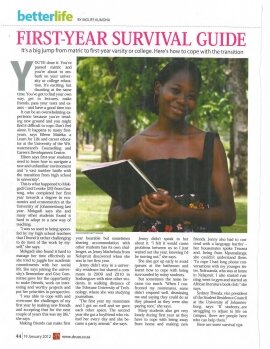
Sexual survival left by the wayside
Melissa Meyer
17 January 2012
As hoards of fledgling graduates flock to tertiary learning institutions, magazines and newspaper feature sections are dispensing sage advice for “surviving” the transition successfully.
Sadly, this advice appears to be largely limited to coping with unruly room or housemates and balancing social activities (like sports and drama) with academic obligation. Yet the two biggies that can really wreck an education – alcohol and sex – have everyone tight-lipped.
Perhaps editors and journalists are weary of drawing direct associations between aspiring young adults and excessive boozing and fornication. This is no doubt influenced by the notion that doting parents are unlikely to be thrilled by articles that implicate their children in binge drinking and sexual risk-taking.
But no amount of pussyfooting can deny that these troublesome two are rather apparent highlights on everyone’s tertiary “learning” agenda.
These two activities are often combined to create a potentially lethal cocktail because sexual-risk-taking increases considerably where alcohol is added to the mix. In a country where more than one in five young women aged 20 to 24 are living with HIV and one in twenty men, this is an extramural activity that is best avoided.
Yet support for fresh-faced students is lamentably thin in this area. An article in this week’s Drum magazine, titled “First-Year Survival Guide” recounts “Jenny’s” experience: “The first year my roommate and I got on well… The second year she got a boyfriend who visited her every day and she became a party animal”.
Instead of using Jenny’s case to address the risks inherent in this situation and providing valuable guidance to all young readers, the article swiftly moves on to solve the very important problem of dealing with roommates who are noisy.
UNAIDS reports that globally nearly half (45%) of all new HIV infections are among young adults (15-24) – incontestable evidence that the youth are ill prepared for some of the risks that early adulthood pose.
Properly equipping students with the skills to navigate risks on their own might require us to let go of taboos and prudish notions around what is “proper” in order to broach subjects of alcohol use and sex. But much rather that, than producing a new generation of adults who may be quite capable of time-management and dealing with noisy neighbours but fail dismally in relationships and health.
blog comments powered by Disqus

